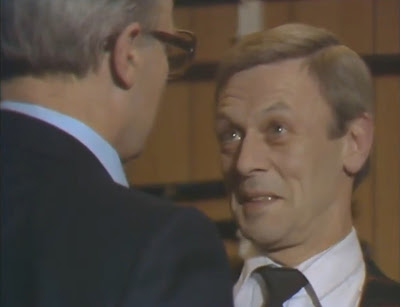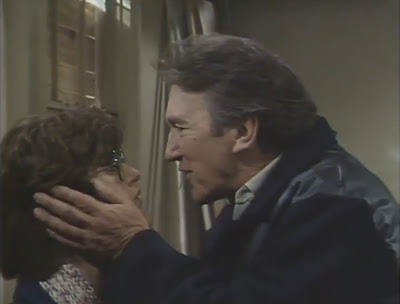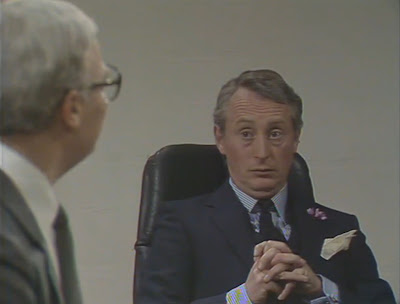 |
| A retired Callan has one last job to do... |
Release Date: Sept. 2, 1981. Written by: James Mitchell. Directed by: Shaun O'Riordan. Produced by: Shaun O'Riordan.
THE PLOT:
David Callan has retired. Now living as "David Tucker," his one-time alias for undercover operations, he is living a comfortable middle-class life. He runs a shop that sells war memorabilia, he has a somewhat undefined relationship with his landlady (Angela Browne), and he is overall content.
Until he receives a message from "Charlie" that reels him back into the Section. The new Hunter (Hugh Walters) insists that he's not reactivating Callan. He simply has news that might be of interest.
Daniel Haggerty (George Sewell), owner of an independent construction company and intermittent liberal politician, is writing a memoir. Nothing that would fall under the Official Secrets Act, but he is working on a chapter about the murder for hire of his daughter's fiancé. A killing that was performed by Callan - information that Haggerty has "somehow" managed to obtain.
Hunter's manipulations may be obvious, but they are effective. If Haggerty publishes, then Callan will spend the rest of his life in prison. There is only one way to stop him. But Callan's no longer the man he was, and he doesn't know if he's still capable of pulling the trigger...
 |
| Seems like old times: Callan calls on Lonely for help. |
CHARACTERS:
Callan: The years have changed Callan, and Edward Woodward adjusts his performance accordingly. The early scenes see a Callan who is more passive. Some of his old personality surfaces when he's called into Hunter's office, but he isn't as cuttingly savage as he often had been with the first or fourth Hunters. As the story progresses, and he finds himself engaging in old patterns, Callan's accustomed anger starts breaking through the "David Tucker" persona - but only in flashes that grow progressively more frequent.
Hunter: Hunter #5 (Hugh Walters) presents himself as a sort of frivolous schoolboy. He talks in a light tone, he never raises his voice, and he practically uses "old boy" as punctuation when he speaks. At a glance, he seems like the least threatening of all the Hunters. But he's laid a perfect trap for Callan. Of course the old spy can recognize how Haggerty learned of him, but he's left with just as few options as if he didn't. The ending reveals another manipulation that was running underneath the obvious one, as well. This unthreatening foppish schoolboy is actually quite sharp, and it's a shame that Wet Job would be his only appearance.
Lonely: Like Callan, he's moved on from his old life. He's now a plumber - generally respectable, and soon to be married to a respectable younger woman. This might be a surprise, given his problem with body odor - but as he informs Callan, he's been happy these past several years. "I never pong when I'm happy." He also recognizes what, on some level, Callan refuses to. "The old days is over, can't you see that? I'm different now, and so are you." He even stands up to Callan when his old friend reverts to bullying... Though he still panics at the thought of police finding him with Callan's gun, knowing that a trip to "the nick" would be the end of his comfortable new existence.
Daniel Haggerty: Callan's target, Haggarty (George Sewell), is a failed former politician and a successful businessman. He has the skillset, interacting with unforced affability, which he's able to put on even when he goes to visit the shop of the man he blames for his daughter's death. It's a tragedy from which he's never really recovered; and while he knows the book will result in Callan going to prison, he also knows that Callan's been to prison before. He fumes that it's not enough of a punishment, and makes private plans to deal with his enemy more directly.
Margaret Channing: Angela Browne, as Callan's landlady, does as well as she can. It's not her fault that Margaret is a bad role. I think she's meant to parallel Callan in some ways. She's middle-aged, but she tries to pretend to youth by sleeping with a younger man at the same time she's sleeping with Callan. The problem is that she comes across as insufferable, shallow, and dull, and I had difficulty believing that Callan was as invested in this relationship as the script insists. There is a nice Easter egg for old fans, however, when the photograph of her long dead husband is shown.
Lucy Robson Smith: Lucy (Helen Bourne) dominates the movie's "B" plot. Lucy is Margaret's niece, an author who is working with Haggerty on his book. She has that particular blend of earnestness and naivete that so easily draws young people into trouble. She is in love with a (much older) dissident Soviet professor, and most of her scenes see her trying to secure the money to get him safely to London. It goes without saying that this dovetails into the main plot... eventually. But it takes its sweet time doing it, and for much of the running time Lucy's scenes are an unwanted distraction from Callan's dilemma.
 |
| Haggerty (George Sewell) helps Lucy (Helen Bourne) secure the release of her much older Russian boyfriend. |
THOUGHTS:
Wet Job sees the final appearance of Edward Woodward as David Callan, and that is the main reason to see it. I remembered it as being a complete disappointment. Happily, on this viewing, I found a lot more merit in it - but it's still decidedly lesser Callan.
The plot is entirely mundane, and it takes a little longer than it should for the "A" and "B" plots to come together. It holds together structurally and even builds to an effective climax. It's just that it's all rather low-stakes and a little too familiar. I also feel that there really needed to be a scene early in the movie with the Soviet professor, to better establish his character and subplot.
As usual with Callan, it's the character moments that help to make up for a stock standard plot. Woodward is excellent as a changed, but still recognizable, Callan, and the film is at its best when focusing on the divide between his new life and his old. This is most visible in the scenes with Lonely, as Callan moves back and forth, first politely asking Lonely for help, then threatening him, then apologizing and claiming "force of habit." There's a general sense that "David Tucker" is as much his real self as "Mr. Callan" is now - although Hunter may have done him a favor, as it's also clear that he needed a bit of his old assertiveness.
Unfortunately, while the Callan material works well and the Callan/Lonely interactions are wonderful, most of the guest characters fall flat. George Sewell and Helen Bourne do a decent job of making Haggerty and Lucy into believable characters, but I'd be lying if I said either of them was interesting. Meanwhile, I have trouble believing that anyone watching this gave even the tiniest fig about Callan's relationship with Margaret Channing. Not to mention the real "wet job" of this film: the callow young operative who is this movie's Meres equivalent... but who makes Cross look tough, sharp, and competent by comparison!
Oh, and the music is terrible. Then again, it is a TV movie from the early '80s.
 |
| The newest Hunter (Hugh Walters) manipulates Callan into a bad situation. So... situation normal. |
OVERALL:
Wet Job is lesser Callan, suffering from a mundane story, uninteresting guest characters, and dreadful incidental music.
All of that said, it's not actually bad. I loved the characterization of Callan here: he's older, and he's more restrained, but that anger is still inside. The scenes with Callan and Lonely are particularly good, with Edward Woodward and Russell Hunter doing sterling work recapturing their old dynamic while also showing how their characters have moved on.
I think this movie could have been good, but the script feels undercooked, like a rough draft hauled in front of cameras before it was ready. The basic story structure is fine, but the pacing feels off and the "B" plot isn't so much established as just dropped onto the viewer. Much of the dialogue is functional rather than quotable, and the new characters lack spark.
Overall, it's a near miss. It has some wonderful individual moments, and I could pick out a handful of worse episodes from the series. But Callan was a great show, and a great character, and both deserved a better final bow than this.
Overall Rating: 4/10.
Previous: Callan (1974)
Next: Callan - This Man Alone
Review Index
To receive new review updates, follow me:
On BlueSky:
On Threads:


No comments:
Post a Comment